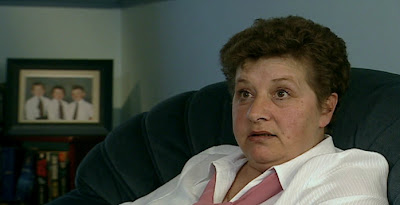



Michael Apted's 49 Up (2005) continues the fascination of the previous films in this longitudinal documentary series. We've gotten to know same group of English men and women who've had their lives peered into, sniffed, and stirred since the age of seven. Skillful editing teases out many small suspenses and unexpected reveals, such whether a character will get (or stay) married, have children, or ever be happy. The interviews, while informal, are beautifully shot and lit. One wonders what is in store for the next film, because by now, at age 49, several of the participants have pushed back against the entire enterprise. Some of them argue with the filmmaker about how they've been represented (Jackie, top) or simply state they will "bow out" next time (Suzy, second still). Two of the participants who did bow out of the series were Peter, after 28 Up, and Charles, after 21 Up (third and fourth stills).
Update: Peter did return to the series for 56 Up.
























